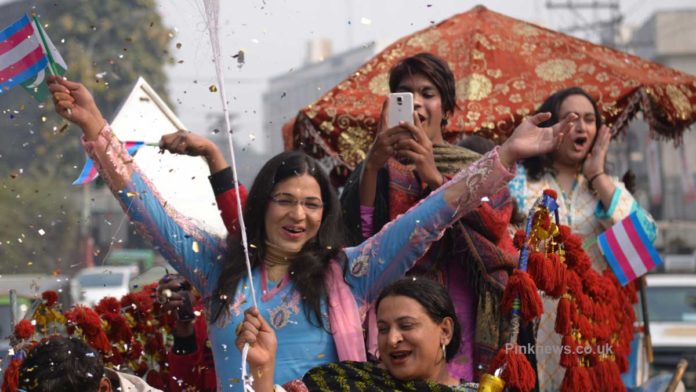
ECONOMYNEXT: For Rafay Shahzad, a Lahore based Queer musician, entering Pakistan’s mainstream entertainment industry has been a traumatic one.
Yet, with quiet determination, Shahzad, Musician and Video Producer has chipped away at the challenges.
Shahzaddescribed his efforts to distribute his work and to get a role in dramas or Television productionsat the web talk,Born with Pride –Queering Media, organised by the Freidrich Naumann Foundation for Freedom (FNF) South Asia, on November 16th.
In her opening remarks, ProfessorGauri Chakraborty of the Times School of Media, Bennet University, India and an Associate Producer, who moderated the session, said that the “entertainment industry is an integral participant in popular culture. It has the potential of influencing the perspective on identity among its audiences. Cultural artefacts and very much so in South Asia that emerge out of this mega and diversified industry also have the capability to create voice.”
Prof Chakraborty explainedthat the aim of the webinarwas to explore how queer individuals are
represented in the industry and the impact that it creates on the audiences.
“In recent times the industry in South Asia has begun representing the queer community. But there is too much to be expected, miles to go, the representation is often not close to reality and therefore it’s very important to have dialogue and discussion on the impact of narratives which circulate in the media, and which influence impressions in young minds, in society and therefore this cause is of criticality,” she added.
Asked what challenges he has faced in making a mark in the music industry as a queer person, Shahzad who has a business degree, said the way has been hard and very difficult because of complex challenges.
“In my university years I found it hard to get my foot in the door as there were very few people who had come out (as queer.) It was not OK to come out and I felt very, very alone.”
He says there weren’t any celebrities he could look up to for mentorship. He points out that Pakistan has its Transgender communities and society is “ok with that, but not many were educated. So, in university I had challenges about coming out.” When there were opportunities for roles in drama, for instance “it was a straight person who would get selected.”
But Shahzad says his circumstances changed when he was a contestant in the 2013 edition of the talent show Pakistan Idol. Although he was not selected,the video of his wacky audition became famous garnering around 983,000 hits on YouTube. “I suddenly became very famous in the whole country.
But I could not handle the pressure.” He says he and his family received threats from strangers. “It was very scary.” He felt that he was somewhat like the first Black artistes in the United States who took a long time to break into the mainstream music industry.
He did record a music video several yearslater and offered it to a TV channel which had said it would be “subject to censorship.” He also says he did not want to portray himself as a straight person. But once he released the video on-line and it started to get hits, he had a positive response. “People started to pour out their love.” He says the 10-to-15-year struggle is nowbeginning to pay off.
In Pakistan the first Pride Parade was held just two years ago. “I performed there as a Mime and also performed one of my own songs.” He says he is taking small steps but as a pioneer and at the cutting edge of a new movement, being slow and cautious is better. “I feel that I am opening the way for new songwriters to come on board.”
He also says that the atmosphere at the Universities and Colleges has become better for Queer persons.
“It’s much better than when I was in University. Nobody wanted to talk to me and the situation around us was quite volatile.”
Prof Chakraborty observed that Shahzad’s pioneering effort will make him a “reference point for others to follow. Someone will walk the path with more confidence looking at your journey.” She also asked Shahzad whether there was someone in the family or known to him who offered support.
Shehzad says he had no such support. He said he had to seek assistance outside the family circle from non-governmental organisations which were providing support. He said he met with an organisation called Dostana which provided support. The word Dostana in Hindi/Urdu means “friendship or amicability” but in general society it is also a euphemism for being gay. The organisation however helps people of any sexual orientation.
Homosexuality is banned in Pakistan with whipping, jail or even death prescribed in statutes. A Bollywood Rom-Com called Dostana was banned in Pakistan in 2013 because “it had significant Gay content.”
Shahzad also talked about the small theatre circuit where a gay dramatist had written gay-themed short plays. He says it was hard even to get universities to stage them. One space that was available was through the Pakistan Human Rights Commission.
He also referred to a movie called “Bol” directed by Pakistani Shoaib Mansoor, about a child who had gender dysphoria. The 2011 feature controversially examined gender identity in Pakistani society. The story centered around a male child who felt like a girl. In the story, Shahzad says, the father of the child was “very Islamic.”At the end the father murders the child.
Shahzad also talked about the Pakistani short film “Darling” about a boy and a transgendered girl which won first prize at the Venice film festival two years ago. The director of the film Saim Sadiq “had a very hard time to enter the movie into the festival,” he recalled.
Shahzad says the breakthrough quality of the movie was that an actual trans-person had been cast in it. “Usually, these roles would be played by straight people which are usually caricatures,” he observed.
The question is “are we setting the right light? Is Pakistan only ready for short films like this or is Pakistan actually ready to receive a proper mainstream narrative with a trans character in a leading role or will Pakistan ever be ready?”
Prof Chakraborty said that short films and the “episodic format” is now very popular and has an important role to play in the industry.
Asked whether the entertainment industry showed him support when he wanted to break in as an artiste, Shahzad replied in the negative. “Because even when I worked in the industry, there was no support.
After what happened at Pakistan Idol I gave up for a while. But now that after a long time a music video has been released,I am waiting to see. But honestly I don’t expect much support from the industry.”
Traditionally the music industry in the South Asian subcontinent is controlled by schools which have grown around a particular outstanding musician or family group. Shahzad says breaking into these closed systems commonly called gharanas is tough.
He also found it hard to find a music teacher because they wanted to teach him a particular tradition. “It was after a lot of searching that I found an open-minded teacher who is now my voice coach,” he said.
Despite the challenges Shahzad is determined to stay the course. His passion he says is to sing about his queer experience, “and that, I want to achieve.”








